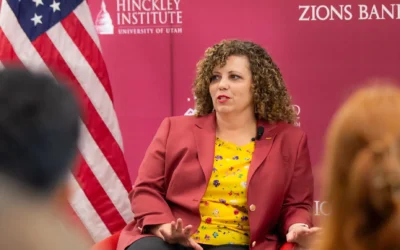Written by
- Charlie Kirk’s murder has raised important questions about free speech, a principle he championed.
- The constitution provides robust protection to free speech, even deeply offensive comments, but it leaves private individuals and organizations free to choose what speech they will endorse or associate with.
- However, the nation will need more than legal protections to truly preserve the culture of civil discussion valued by the Framers.

It is a tragic irony that the assassination of Charlie Kirk was motivated by disagreement with his message, part of which involved promoting free exchange of ideas. That horrible event has, in turn, spurred additional discussions, and unfortunately also accusations and contention, about the meaning of free speech.
In the United States, these discussions take place in the context of robust constitutional protections of that right. Some of the disagreements are understood better when examined in that context.
For instance, some government officials have expressed a desire to limit “hate speech.” The sparse wording of the First Amendment, of course, does not create categories of speech, so the term does not have any particular legal significance. For some, it is a way of describing opinions they find hurtful and offensive. The U.S. Supreme Court has repeatedly held that the government cannot punish speech just because it is offensive, and the cases include some truly objectionable examples. (In some instances, the court may have gone too far.)
Perhaps, though, some may use this term intending to refer to a very narrow exemption from free speech protections. Many believe that there is an exception for protection for speech that is analogous to shouting fire in a crowded theater, i.e. a statement that can cause imminent and serious harm. Though that analogy was used in an early-Twentieth Century Court decision, the facts of the case involved (distributing leaflets critical of the government) would almost certainly be protected now. The Court has actually established that speech may not be protected if it is “directed at inciting or producing imminent lawless action” and is “likely to incite or produce such action.” In the case in which that rule was announced, the Court reversed the conviction of a Ku Klux Klan leader for a speech threatening possible “revengeance” on federal officials. A simpler formulation is that a “true threat” is not entitled to First Amendment protection. This exception is rarely applied.
Another important free speech principle is that the First Amendment is meant as a limitation on government action. Thus, private organizations generally are not covered. This is relevant to the debate over “cancel culture.” While it is wrong to destroy a person’s career or life over a disagreement about opinions, that does not make it unconstitutional. Now, some of the statements made supporting murder or violence go beyond mere disagreement. Even so, private employers are not prevented by the constitution from disciplining or firing employees for their opinions and, in some cases, may feel that they need to if the employee’s opinions reflect badly on the business.
One important caveat is that even private actions can sometimes constitute a constitutional violation or raise constitutional issues. For instance, as many have noted, the government threat to a television station because of an employee’s offensive comments is likely one of these instances.
The constitutional protection of free speech is very robust. That does not mean, though, that our culture truly values an open exchange of ideas. Laws can only do so much. Personal commitment to civil discussion is more important, but the fact that the Framers felt strongly enough about the importance of free speech should provide powerful motivation for that commitment. In a polarized culture, powerful motivation is critical.

Insights: analysis, research, and informed commentary from Sutherland experts. For elected officials and public policy professionals.

- Charlie Kirk’s murder has raised important questions about free speech, a principle he championed.
- The constitution provides robust protection to free speech, even deeply offensive comments, but it leaves private individuals and organizations free to choose what speech they will endorse or associate with.
- However, the nation will need more than legal protections to truly preserve the culture of civil discussion valued by the Framers.
Read More
Rep. Celeste Maloy participates in 2025 Congressional Series
Rep. Maloy spoke of the recent tragic death of Charlie Kirk and how students should not fear getting involved in politics.
Utah’s unique opportunity in open enrollment policy
Utah’s strong open enrollment law could be strengthened by a statewide one-stop shop platform. Such a hub would help parents easily compare school options, access deadlines, and find district policies, creating more clarity and transparency in public education.
The redistricting battle: What does the constitution say? | Bill Duncan
As redistricting debates make headlines in Utah and across the nation, a deeper issue is being overlooked: Who really has the constitutional authority to draw electoral maps?
Connect with Sutherland Institute
Join Our Donor Network
Follow Us
The post What Americans get wrong about the “hate speech” debate appeared first on Sutherland Institute.













